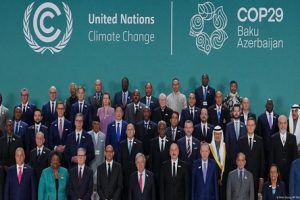Ethiopia is leading the charge in the global shift towards a green economy, recognizing the critical need for sustainable development that harmonizes economic growth with environmental stewardship. The government identifies that economic prosperity, environmental health, and social equity are interconnected and has committed to transitioning to a climate-resilient economy.
The country has set an ambitious goal of becoming a climate-resilient economy by 2030, targeting crucial sectors such as agriculture, energy, and forestry. The country that enjoys rich natural resources heavily invests in renewable energy, including hydropower, wind, and solar. These initiatives aim to minimize ecological impact while generating employment and enhancing the livelihoods of its citizens. By embedding sustainable practices within its economic structure, Ethiopia is positioning itself as a beacon of green growth in the region.
Ethiopia is making significant strides in its commitment to various climate initiatives aimed at reducing carbon emissions, combating air pollution, and promoting clean energy solutions. These efforts are underscored by the Climate Resilience Green Economy strategy, a comprehensive framework designed to transition the country toward a sustainable future.
Sahrela Abdulahi, the Director-General of the Petroleum and Energy Authority, highlighted the importance of this strategy in cutting carbon emissions and facilitating investments in e-mobility. This initiative not only addresses environmental concerns but also aims to position Ethiopia as a leader in green technology within the region.
She pointed out that, Ethiopia intends to increase energy access via mini-grids from the existing 10% to 35% within the framework of the National Electrification Program (NEP). Its ambitious goal reflects Ethiopia’s commitment to ensuring that all citizens have access to clean energy.
Sahrela mentioned the vital technical support from GIZ-Energy and emphasized the importance of coordinated efforts with various stakeholders. Such collaboration is crucial for overcoming challenges and ensuring that the electrification initiatives are both effective and sustainable. In addition to expanding electricity access, the Ethiopian government is also focused on developing a climate-resilient transport strategy.
Yizengaw Yitay, a Senior Climate Change Expert at the Ministry of Transport and Logistics, outlined the government’s plans to establish standards for electric vehicles (EVs) and the necessary charging infrastructure.
He pointed out the urgent need for incentives and policies that will facilitate the transition away from fossil fuels and promote the growth of the EV sector. To this end, the ministry is revising its draft strategy to aim for 500,000 electric vehicles on the road within a specified timeframe. This target draws inspiration from successful examples in California, China, and Oslo, which have made significant advancements in electric mobility.
Ethiopia is making a 10-year plan to double the amount of electric vehicles (EVs) on Ethiopian roads. By 2030, the country desires to have increased the current number of EVs on the road from about 70,000 to 152,000. This initiative is part of a larger movement to replace gasoline-powered vehicles with more environmentally friendly and sustainable modes of transportation.
He stated that, to support the burgeoning EV sector, the Ethiopian government is collaborating with private investors to build the necessary infrastructure. This includes providing incentives such as excise tax and VAT subsidies to encourage investment in electric vehicles. He further stated that, efforts are being made to facilitate tax-free imports of charging machines, streamline land access, and simplify licensing processes for EV-related businesses. These initiatives are crucial for building investor confidence and promoting a sustainable e-mobility market.
Yizengaw highlighted the rapid increase in vehicle numbers, which has grown by 14% annually. Despite the infancy of the EV sector in Ethiopia, he advocates for incentivizing investors and business people to build their trust in this emerging market. The government recognizes that a robust EV sector can significantly reduce the country’s dependence on imported fuels, which currently costs Ethiopia approximately 2.4 to 2.6 billion USD annually. Transitioning to electric vehicles will not only help mitigate this financial burden but also promote energy independence, he said.
Furthermore, the government prioritizes renewable energy, sustainable agriculture, and efficient resource management to reduce its carbon footprint while bolstering productivity and resilience. The green economy strategy also encourages innovation and entrepreneurship, fostering the development of green technologies. By investing in research and development, Ethiopia is nurturing a sustainability-focused culture that empowers local communities and creates jobs in emerging green sectors.
Beyond environmental advantages, this strategy tackles urgent social issues such as poverty and inequality. By embedding social equity into economic planning, Ethiopia ensures that the benefits of growth are distributed across all segments of society, particularly marginalized groups. This comprehensive approach enhances social cohesion and fortifies the overall resilience of the economy.
The role of technology in enhancing Ethiopia’s electric network cannot be understated, Mintesnot Gizaw, an Assistant Professor and Renewable Energy Researcher at Addis Ababa University, emphasized the importance of deploying artificial intelligence (AI) and other advanced technologies to digitize the electric network and infrastructure.
This modernization is essential for improving power quality and ensuring a reliable and scalable EV system. He further pointed out that, Ethiopia’s abundant renewable energy resources, if effectively harnessed, could significantly contribute to the country’s energy needs. However, the researcher stressed that viable policies and strategies are necessary to encourage private sector involvement in off-grid developments, which can boost job creation and contribute to national development.
Ethiopia’s reliance on imported fuel is a significant challenge, as the country currently spends a substantial amount of its foreign exchange reserves on fuel imports. By focusing on renewable energy and electric vehicles, Ethiopia aims to tap into its off-grid and renewable energy potential, which is currently utilized at only 10%. This transition is seen as a critical step toward reducing dependency on imported fuels and fostering a more sustainable energy future.
Moreover, the shift to electric vehicles aligns with global trends towards sustainability and climate resilience. As countries around the world increasingly prioritize reducing greenhouse gas emissions and enhancing air quality, Ethiopia’s proactive measures position it favourably on the international stage. The government’s commitment to climate initiatives not only reflects recognition of the urgent need for environmental stewardship but also opens doors for international partnerships and investments in clean energy technologies.
Significant to this effort is the Green Economy Strategy, which focuses on reducing greenhouse gas emissions, promoting sustainable land management, and advancing clean technologies. This strategic framework not only aligns with global climate initiatives but also serves as a model for other nations.
Besides, Ethiopia is at a pivotal moment in its journey toward a sustainable, climate-resilient future. With initiatives aimed at reducing carbon emissions, expanding electricity access, and promoting electric mobility, the country is taking significant steps to address environmental challenges while also fostering economic growth.
The collaboration between government agencies, private investors, and research institutions will be essential in realizing these ambitious goals. As Ethiopia continues to harness its renewable energy potential and develop a robust e-mobility market, the benefits will extend beyond environmental sustainability to include economic opportunities and improved quality of life for its citizens.
BY FIKADU BELAY
The Ethiopian herald September 1/2024





